Israeli Scene
Feature
Coworking Hubs Unite Solo Israelis at the Office

High-tech entrepreneur Jon Rathauser does it because all his health care startup employees live outside Israel. Architect Bracha Cohen does it to be among other professional haredi women. Freelance comedian and educator Benji Lovitt does it simply to get out of his house.
They are among the thousands of Israeli corporate employees, entrepreneurs and freelancers of all ages fed up with working from their apartments and neighborhood cafés. Preferring to do their solo work in the company of other people, they rent desks or private offices on a monthly, weekly, daily or even hourly basis at one of the country’s more than 200 coworking spaces.
Coworking spaces—also known as hubs, with their comfy yet professional décor and WiFi, office supplies, beverages and snacks—were nowhere to be found in Israel, or anywhere, until several years ago. In the Jewish state, the concept quickly took off after industry giant WeWork opened its first location in Israel on Dubnov Street in Tel Aviv in December 2014.
Founded in 2010 by Miguel McKelvey and Israeli Adam Neumann and headquartered in New York, WeWork, a privately held company currently worth north of $20 billion, operates 450-plus offices for its more than 250,000 members in 29 countries around the world. The company has 10 sites in Israel: five in Tel Aviv and one each in Herzliya, Beersheva, Petach Tikvah, Haifa and Jerusalem. Many of these are smaller hubs that are independent and offer unique twists—such as a distinct atmosphere, member demographics or location.
According to Eitan Singer, CEO of Spacing, an online platform where users can browse and compare the coworking marketplace in Israel, two-thirds of these spaces are for profit. The rest are either public hubs run by municipal authorities or nonprofit ventures, including several that are for women only as well as one that promotes coexistence initiatives between Jews and Arabs.
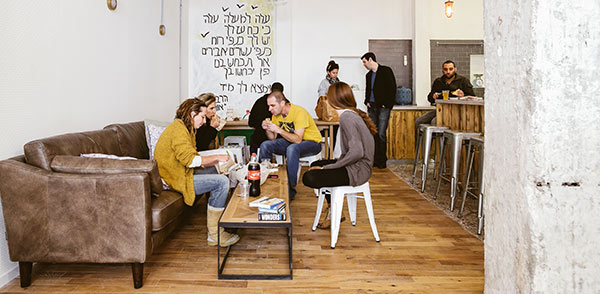
Membership rates vary greatly. For instance, at WeWork, a hot desk in Tel Aviv—guaranteed workspace in a common area, the most affordable option—starts around $200 a month. Nefesh B’Nefesh, a nonprofit promoting and facilitating aliyah to Israel from the United States, Canada and the United Kingdom, opened a hub in Tel Aviv in 2017 in response to an influx of entrepreneurial millennial immigrants to the city. Membership at that hub is essentially free, requiring only a $30 deposit for an electronic chip that provides access to the premises.
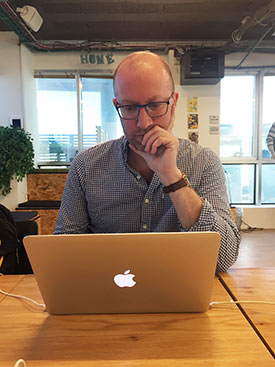
Nefesh B’Nefesh’s Israel program manager Benji Davis conceived of NBN TLV Hub while he and his colleagues were renting space at one of WeWork’s Tel Aviv locations. He oversaw the construction and interior design of the space—3,000 square feet on an upper floor of a Rothschild Boulevard office building that features floor-to-ceiling windows, sturdy wooden tables, couches and an outdoor patio. Vintage Israeli posters and hipster caricatures of Zionist and Israeli leaders like Theodor Herzl, David Ben-Gurion and Golda Meir add pops of color to the otherwise neutral color scheme.
“The idea was to create a space for young olim to work and have access to NBN’s post-aliyah and employment advisers, and also to create community,” says Davis. Among the 15 people working at the hub one recent morning was 28-year-old Rathauser, who founded Keheala, a mobile health platform for patients in the developing world.
At a table across from him sat Lovitt. The comedian made aliyah 11 years ago from Dallas and today performs standup and hosts cultural workshops about Israeli society for federation groups, synagogues, Jewish community centers, Hillels and other organizations around the world. A more veteran immigrant, he said he enjoys opportunities to network as well as answer newer immigrants’ questions about adjusting to Israeli life.
“I worked from home for years and it was terrible,” says Lovitt, 43. “Coworking spaces have been a life-changer for me. I just wish there had been an NBN hub when I first got here.”
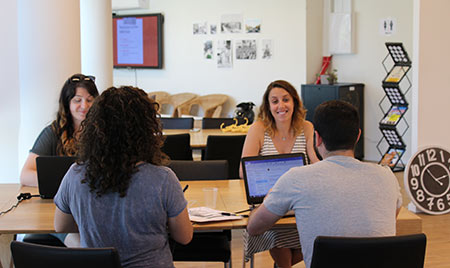
Jerusalem is home to a number of niche nonprofit coworking spaces. One is the Alliance House, located in a 19th-century school building and containing 14 artist collectives operating from shared workspaces. Vaulted ceilings, a smattering of vintage peeling paint, exposed stone walls and oversized arched windows with wrought-iron grates are charming reminders of Jerusalem’s history for tenants, among them the avant-garde c.a.t.a.m.o.n. Dance Group. The house also offers a variety of subsidized or free work areas for entrepreneurs, writers and researchers to stage events. Some 35,000 people have participated in these happenings, including an exhibit of food photography that was part of last year’s Open Restaurants food festival and a Tikkun Leil Shavuot night of Torah learning that attracted more than 1,000 Israelis from across the religious spectrum.
Alliance House, funded by the Israeli government as well as private donors, is a project of New Spirit, a nonprofit founded in 2003 by a group of students to strengthen Jerusalem’s creative economy and reverse the migration of young adults from the capital.
Across the city, in the East Jerusalem neighborhood of Sheikh Jarrah, is Peacework Jerusalem, a shared workspace for coexistence organizations established by Kids4Peace Jerusalem. Hundreds of youth meet weekly for dialogue groups, shared meals, community service projects and other activities under the auspices of Kids4Peace, an interfaith nonprofit founded in 2002.
Peacework currently gives space to organizations such as Runners Without Borders, Seeds of Peace and Israel/Palestine: Creative Regional Initiatives (formerly the Israel-Palestine Center for Research and Information). “You just need to be someone working toward positive change in Jerusalem and be an active member of the community to be welcome,” says Kids4Peace co-director Meredith Rothbart.
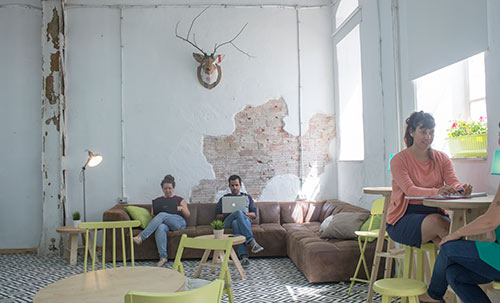
Located in the basement of a nondescript apartment building behind the Israeli police national headquarters and next to a car repair shop, there is no sign announcing Peacework’s presence. The low profile is deliberate. “There are so few places where Israelis and Palestinians can feel safe meeting on a regular basis,” says Rothbart.
Several coworking spaces in Israel cater exclusively to women. WMN, a professional community, coworking space and high-tech consortium for female-led ventures, was launched in Tel Aviv in 2015 by serial entrepreneur Merav Oren. The nonprofit initiative seeks to significantly bridge the gender gap in high-tech. To that end, WMN only welcomes startups with at least one woman as founder or CEO.
“By creating a physical and virtual community, women are more encouraged to share, get support and have a balanced environment, especially in the early stages of the startup,” states Oren. “The entrepreneur’s journey is a very lonely one, regardless of whether you’re a man or a woman, but since there are so few female founders, being a part of a community that shares the same challenges helps. WMN also exposes the community members to activities through different channels and expands the diverse startup ecosystem.”
Singer, of the online Spacing platform, notes that despite coworking’s rapid growth in Israel, the trend is not as strong as in other parts of the world. There are still plenty of Israeli entrepreneurs who prefer coffee shops. “Israelis are embracing the coworking trend, but I wouldn’t say it’s on steroids here,” he says. “Israelis are frugal. They aren’t going to spend money on renting work space until they are completely ready. In the U.K., where the concept started, there are 800 sites, and there are 500 spaces in New York City alone. There’s also growth in Italy, Germany and the Netherlands. It’s also big in East Asia, especially Hong Kong and Beijing.”
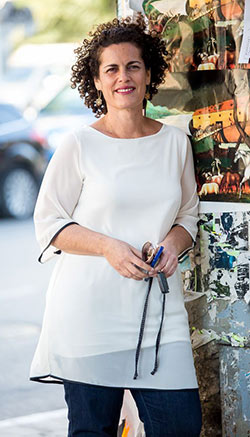
While occupancy rates at coworking spaces in the Tel Aviv area hover around 94 percent, according to Singer, it would be a mistake to ignore less urban areas of the country. For instance, far from the hustle and bustle of Israel’s Silicon Wadi—a concentration of high-tech businesses around metropolitan Tel Aviv—is Hub Etzion. On the top floor of a building in the Gush Etzion Industrial Park, the only coworking space in the West Bank looks out over the Judean Hills south of Jerusalem.
Public relations professional Rachel Moore opened Hub Etzion in 2015 to help locals reduce or eliminate the need to commute to jobs in central Israel and also to build up the technology ecosystem in the Gush Etzion region. The space, which includes gym facilities, aims for an industrial-chic esthetic with exposed brick and pipes. “There’s a misconception that it’s just caravans out here,” says Moore. “A lot of English speakers and tech- and business-savvy people live in Gush Etzion. I really believe we can build a tech scene here.”
Multiple Tel Aviv tech companies now pay for their employees who live in the area to work at Hub Etzion, says Moore, so they don’t have to commute. Monica Haber, a 50-something technical writer who lives in the Alon Shvut settlement, commuted to Herzliya for years—up to two hours one way in traffic. Now she works for a Tel Aviv tech company that gladly rents her a desk at Hub Etzion. “I finally feel like I know what is going on in the local community, because I’m not commuting all the time,” she says.
Among Hub Etzion’s approximately 30 monthly members are also individuals who work for international companies, self-employed professionals with client bases in Israel and abroad, and writers and academics who prefer to work outside their homes.
For Chaim Sherman, a forensic accountant whose business partner and clients are in Toronto, Hub Etzion presents an opportunity to be around people during the day and avoid the distractions that come with working at home. “I would still be working at home had the hub not opened up,” says the resident of the Neve Daniel settlement who is in his 50s. “I wouldn’t consider driving into Jerusalem to work at a coworking space because of the terrible traffic.”
Indeed, Israel will soon see a rise in coworking spaces in peripheral regions. A $25.5 million investment by the Ministry for the Development of the Negev and Galilee will establish 45 new tech hubs, including some slated for Arab towns. Kibbutzim are also looking to transform 200 abandoned or underutilized buildings into coworking spaces or tech accelerators.
Israelis are friendly people, so it isn’t surprising that coworking spaces are becoming popular, notes Singer. “It’s not the physical space that’s the main draw,” he says. “It’s the chance to get out of the house and network and connect with other people.”
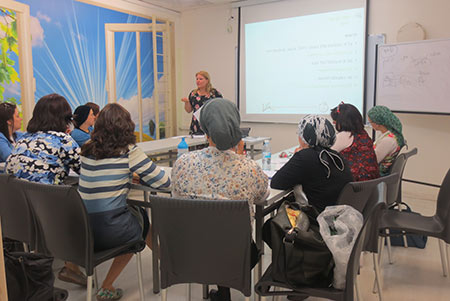
A Kosher Space for Observant Female Entrepreneurs
Men are conspicuously absent at the Jerusalem Hub, Israel’s first professional coworking space predominantly for haredi women. The hub is located in a new office building on Jaffa Street, at the edge of some of Jerusalem’s ultra-Orthodox neighborhoods. The space was opened in 2013 by Temech, a nonprofit that empowers and trains Orthodox women to maximize their employment opportunities and help them achieve financial success.
“We became aware of the many women who choose to pursue entrepreneurship or small business pursuits instead of—or in addition to—job opportunities,” says Temech CEO Shaindy Babad. “However, they were ill-equipped for and often unaware of good business practices, and they lacked knowledge and know-how. They also often had to work out of miniscule spaces shared with family. The time had come for a full-service, professional resource and hub platform to help women in the religious community build businesses.”
To assist in skill-building, Temech partners with the Jerusalem Municipality and a variety of companies and entrepreneurial organizations to provide training and networking opportunities for the hub’s 2,000 members.
On an average day, around 60 women, their hair covered by wigs, scarves or hats, use the large, sleek, professionally appointed space that features a bank of computers—equipped with internet filters for religious and modesty considerations—in a central open area as well as seminar rooms and private offices. More personal, colorful touches are added by shelves and glass cases that line the walls and display the artwork, handicrafts and educational materials some members produce and sell.
Twenty-nine-year-old Bracha Cohen, who runs an architecture and design company, rents a private office for herself at the Jerusalem Hub and two computer stations for her employees. “Having a respectable place to meet clients,” she says, “is important to me.”
Renee Ghert-Zand is a freelance journalist covering Israel and the Jewish world from Jerusalem, where she lives.








 Facebook
Facebook Instagram
Instagram Twitter
Twitter
Leave a Reply